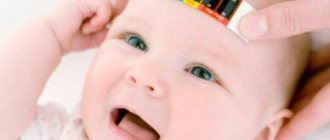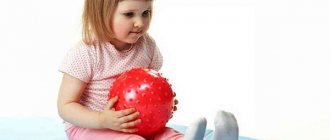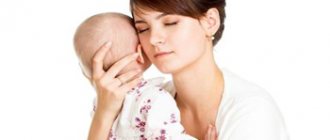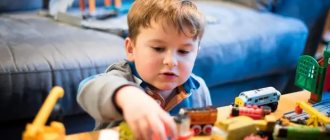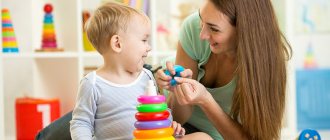When a child hits himself, it always causes great concern for parents. Outwardly, self-punishment manifests itself as a whim: the child is irritable, he may tensely pull his hair, or he may vigorously bang his head against the wall or floor. And although this behavior can be considered a childish prank, its main reason is improper upbringing.
What is the reason for this behavior?
Self-punishment refers to aggressive behavior; its only difference is that this aggression is suppressed due to improper parental education. As a result, aggressiveness began to take on a passive character.
And until this behavior is recognized and rebuilt, the child will continue to have the power of unspoken pain. As he grows older, he will seek solace in food, theft, and other forms of “soothing.”
The reasons that allow a child to react in this way are varied and partly depend on his temperament. Let's look at each of them.
A child may hit himself or herself as a sign of protest.
If infants are completely subordinate to the will of their parents, then children aged 2 years and older begin to seriously resist submission. Protest in itself is a quality of a leader, so the trait of such children is demandingness. It is difficult for such a child to give up something to which he thinks he has an innate right.
Such a violent reaction is formed in response to the excessive severity of parents, the abundance of prohibitions and rules in upbringing. If our will were repeatedly suppressed, then direct expression of aggression towards the offender, as well as the desire for intimacy (for example, asking for something that is forbidden to him), would give rise to enormous fear in us.
Thus, the child struggles with his own humiliation and restriction of freedom by using force against himself.
Wrong punishment in this case: shout at the child, hit the child.
The result of the punishment: the child cries even louder.
An effective response for a mother is to gently hold the child when he hits himself. Sit next to him, calm him down, hug him. In this situation, the most trustworthy interpretation of the child's feelings will be. “Mom didn’t allow me to eat the candy now, and you were very angry with mom. You can eat two at once after lunch.”
Note: review unnecessary requirements for the child, remove some of the prohibitions. Learn to compromise.
A child may hit himself when he feels guilty
Another option is children who differ from the first ones in having a weak nervous system. These are children who grew up surrounded by parents who verbally limit children's opposition. Such parents often scold their children, label them, and call them offensive nicknames.
Consider a typical situation at home. A child broke a toy and is trying to fix it. He doesn't succeed, he gets angry and hits himself in the ear. If a child often hears offensive words for some mistake, he, doing something that his mother will not like, mentally scolds himself.
Patting on the ear is an unconscious reaction that communicates that it hurts the baby to hear him called names. Children belonging to this type can be recognized by their behavior. When hit, the child does not rebel, unlike the first type. Crying occurs as a reaction to pain.
The wrong punishment in this case is to lock him in a room and not pay attention.
The result of the punishment: the child continues to hit himself.
An effective reaction from the mother: relieve internal tension, offer something interesting. Mom's comment: “Is the toy broken? It’s okay, my sunshine, don’t be upset, I still love you. Even if mom is angry, she will always love you. Let's try to fix it together."
Note: Refrain from excessive verbal criticism. Show love more often.
A child may hit himself to get what he wants and feel influenced
Children manipulate their parents for several reasons: to get a portion of love and attention, to hide their tricks, and also to make their parents feel guilty and self-pity.
Children are very talented observers, and most often the reason for children's manipulations lies precisely in the behavior of their parents. Parents of little manipulators are accustomed to please their beloved child with all their might. Children's tears cause a feeling of guilt, and now we are intensely patronizing them, cajoling them, ingratiating ourselves, becoming overly lenient in cases where we need to show firmness and consistency.
It’s easy to spot such a cunning person: as a rule, in such cases the child hits himself and watches his mother’s reaction.
Wrong punishment: immediately change anger to mercy. Showing attention and tenderness will only reinforce unwanted behavior in the child.
An effective mom response: teach a new behavior. Distract the child, ask an unexpected question, or leave the room. Mom’s comment: “Did you want to say something?” Continue with your business and comment further: “When you're angry, I want to know about it.” After hearing your child's response, reinforce the new behavior with praise. “It's good that you said you're angry. When you hit yourself, I don’t understand what you want to tell me.”
Note: learn to switch your child’s attention and keep him from unwanted behavior.
In conclusion, I would like to wish parents to learn the most important thing - raising themselves. Only then will we be able to correctly and positively correct the behavior of our children.
Elnara Agayeva, family psychologist
Children behave in a variety of ways, their actions and actions often cause delight and tenderness among the adults around them. However, not all the baby’s actions may be normal; some of them look very strange from the outside and make parents worry.
You can often notice that a child hits himself - most often on the head, sometimes children hit themselves on the hands. You should not immediately perceive this behavior as painful, since there are a number of reasons why he does this. A baby up to 3 months old can hit himself unconsciously, since he is not yet able to control his actions.
Scientists say that up to 20% of children hit themselves on the head or hit themselves, for example, against the side of a crib. According to statistics, boys do this more often than girls. The habit usually appears between 1.5 and 2 years of age and should normally disappear by the age of three. Child's individuality
, the environment around him and various factors influence whether the baby will hit himself on the head for just a month or a whole year.
Regardless of the child’s age, in order to understand the cause and eliminate the problem, you must try yourself or with the help of specialists to understand what type of personality the child belongs to and determine the characteristics of his character. It happens that the reason for such behavior lies in isolation and excessive concentration on oneself.
Why does a 1 year old child hit himself on the head?
To help the baby get rid of
from an unpleasant habit, first of all you need to understand its reasons. Parents should not panic or be afraid that their child will harm their health. Remember that most children with this habit are actually healthy and do not have any pathologies.
Often this action is associated with the baby’s high emotionality and irritability; the psychological situation in the house can also affect it; perhaps the baby doesn’t like something. In this way he will show his dissatisfaction.
Reasons for this behavior at the age of one year:
- Lack of attention from adults
. In this way, the baby can attract attention to himself. He realizes that his behavior will excite adults and they will spend a lot of time next to him, catering to all desires. - A way to relax
. Surprisingly, in this way the baby can calm himself down, the baby makes rhythmic movements and relaxes. - Expression of emotions
. A one-year-old child does not yet know how to correctly express his emotions, convey his frustration through words, so he tries to calm down and throw out his negative feelings. - Ear pain
. A one-year-old baby will not be able to tell his parent that something hurts. Perhaps he has an ear infection or teething syndrome, so he hits himself to numb the pain and show his mother that he is sick. - Sign of illness
. Sometimes this is how developmental deviations manifest themselves. To talk about the presence of a serious illness, consultation with a qualified doctor is required. - Hyperactivity and intracranial pressure
. Regardless of age, the cause may lie in increased intracranial pressure or simply in the baby’s hyperactivity. To exclude such factors, you should visit a specialist.
Unfavorable family situation
The next common reason for such behavior in a child is the unfavorable psychological situation in the family. Frequent quarrels between parents and physical violence in the family undoubtedly disturb the fragile psyche of the child. The kid is simply lost, does not understand what is happening, and cannot find a solution to the current problem.
In such an environment, a difficult child grows up, as they call it in society, who is constantly capricious, fights, and shows aggression both towards himself and towards the people around him. In this situation, the child’s psychological state depends only on the further behavior of adults and their decisions regarding the current situation in the family.
Parents' actions to resolve the problem
Parents can help get rid of the bad habit of hitting themselves on the head by:
Parents must first learn to cope with their feelings and emotions. You shouldn’t show your irritation if, for example, your baby didn’t sleep well at night and didn’t let you get enough sleep. Otherwise, he will definitely feel guilty. Mom and dad should create an atmosphere of calm and comfort for the baby.
If you can’t cope with the problem on your own, you can turn to your loved ones and grandparents for help. If the child goes to kindergarten, then discuss the problem with the teachers. You can also visit a child psychologist who will help you understand the true causes of the problem and, if necessary, refer you to other specialists for examination.
In such situations, neurologists, as a rule, prescribe herbal-based drugs; with the correct dosage, they will not cause harm and will supply the body with vitamins and nutrients.
Why does a child hit his head on the floor and walls - reasons, how to react and what to do?
After the birth of a child, parents try to fill gaps in knowledge regarding possible problems with raising him. At the same time, despite being prepared and flexible in changing circumstances, they do not always understand how to respond to certain aspects of the baby’s behavior. One such case is when a child hits the surface of the floor and walls.
There are parents who feel guilty for illiterate upbringing; some begin to shame the child, try to distract him or scold him. Someone turns to a qualified specialist to get the necessary recommendations. More experienced parents try to ignore this behavior of the baby.
Treatment with the help of a psychologist
If you can’t cope with the problem on your own or the baby is over three years old and the behavior does not change, then you should seek the help of a psychologist. He will not only help you find the causes, but also, if necessary, prescribe appropriate treatment.
Treatment methods:
If the child feels well
, development meets all standards, then over time the habit will disappear. However, if after three years it persists, you should consult a pediatric neurologist.
Remember, even if your baby has outgrown the habit of hitting himself on the head, you must not forget that he had it. Teach him to behave correctly in stressful situations, overcome feelings of guilt and resentment, and cope with difficulties. Then your baby will grow up to be a healthy person, with a stable character and the ability to behave in different life situations.
Of course, this situation is unpleasant and alarming. But completely harmless reasons can cause a child’s aggressive behavior, after which the problem will disappear.
Children often hit themselves on the head to get attention.
Having analyzed what could have provoked this condition, it is easier to choose ways to calm the child:
- This may be a reaction to lack of attention. This situation especially often arises after the birth of a second child, which takes on part of the parental care.
- In dysfunctional families, where adults often quarrel, the child cannot understand the situation and spills the tension on others and on himself.
- This behavior happens at a crisis age for the baby. Parents cannot understand why a one-year-old child hits himself on the head, but he simply expresses disagreement with the restriction of his freedom. The next difficult moments in development occur at 3 years and during adolescence.
- Gradually growing up, the baby begins to react sharply to restrictions. Self-directed aggression can be caused by egocentrism and the desire to achieve what you want at any cost.
- Sometimes this behavior is a manifestation of mental illness. Parents should be alert to sudden attacks and equally abrupt transitions to a calm state.
In most cases, parents are able to cope with their child’s aggression on their own. But without consulting a specialist, there is a possibility of missing the onset of the disease, mistaking it for a whim, which will lead to a deterioration in the child’s condition.
To punish or not?
Despite the fact that many popular advisers recommend spanking the hysterical person, Evgeny Komarovsky opposes physical punishment. This way out is a way of relaxation for the parent, but it does not contribute in any way to solving the problems of tantrums in the child. Moreover, the little one will quickly understand that blows can solve problems, which he will begin to use in everyday life.
If you cannot cope with the irritation, it is better to put the child in a corner for a time that corresponds to the baby’s age: at 1 year - for 1 minute, at 2 years - for two minutes, and so on. It is necessary to punish immediately, and not after the day, because after lunch the baby will simply forget that he rolled on the floor in the store in the morning, disgracing the parent and demanding the purchase of another car.
What to do if a child hits himself on the head
Methods for correcting the situation depend on its causes. Consider the possible options, consult with your pediatrician, talk to your child and try to influence him:
- Try to maintain contact with your child. For a child, the authority of the parents is unshakable, and the trusting nature of relationships in the family depends on you.
- If the baby is naughty, do not shout, try to calmly point out to him the wrong behavior.
- Don't pay attention to whims. If you make concessions in a controversial situation, the child will look for different ways to influence adults and achieve what he wants.
Hello, friends! Today we will deal with a rather serious issue of a child’s attitude towards himself. After all, sometimes there are situations when a child begins to hit himself on the head. Does he do this on purpose or by accident, does this indicate some kind of illness related to the child’s psyche, what should parents do in such cases. We will try to figure it all out in this article.
Emotional breakdowns in public places
It happens that a child starts hysterical in a public place. He falls to the floor, screams, hits his head and hands on the floor. The situation is quite similar to the previous one, however, there is another reason why a child, going crazy, bangs his head - auto-aggression.
Psychologists use this term to describe a child’s desire to take out his aggression and dissatisfaction on his parent when he cannot get what he wants.
In this case, you need to cope with the child in several ways.
If your child throws a tantrum in a crowded place, you need to pay minimal attention to his behavior and pretend that you are leaving
Reasons depending on age
Very small
Many children at an early age, starting from two or three months, can hit themselves on the head. They do this especially well when they have some kind of rattle in their hands. The child rattles the toy, then, out of the blue, hits himself on the head.
In such cases, there is no need to worry. The child does not do this on purpose. He's just still very small and adapting to the world around him. His muscles are weak and he cannot precisely coordinate his movements. So it turns out that as soon as a child takes something in his hands, he can accidentally hit himself on the head.
Our baby, when he was still very small, did exactly the same. We deliberately did not give him large, heavy rattles so that he would not hit himself with them. But, as soon as the child turned 5 months old, such problems stopped. True, after six months, others begin, when the child tries to sit or crawl, he may hit his head on his crib or some pillow.
This will continue until the child clearly learns to coordinate his movements and learns to sit normally.
In this case, there are no psychological problems.
If one-year-old children hit themselves on the head
Here things are already a little different than with newborns. A child at this age does not hit himself on the head by accident, but for some specific reason. These reasons can be both serious and completely banal.
- The baby attracts attention. He already has character and he understands a lot. If he deliberately hits himself or hits his head and cries, they will immediately run up to him and everyone will begin to feel sorry for him and say something. But this is exactly what the baby needs: he will immediately have company, kind words, and pity from adults.
- If the baby lightly taps his head and rocks at the same time, he may be doing this in order to relax. Yes, sometimes they do this if they can't sleep or calm down.
- The child just has a headache, but he can’t tell about it yet, so he points to the place of his discomfort. So, if this behavior of a child is observed occasionally, then perhaps it really is a common headache.
- Hysterics. The baby was upset and could start crying a lot. Emotions at this age can already wash over children. In this regard, we can observe the following behavior.
- The development of some serious psychological illness, such as autism. This is generally a separate topic and in addition to the fact that the child hits himself, there are several other symptoms. And such diagnoses should be made by an experienced specialist.
Children 2 and older
If you pay attention to a six-month-old child when he slightly hits something, you will notice the following thing. The child will look at you after the blow, if you do not react to him in any way, then he can continue to play as if nothing had happened. If you laugh, he may smile or laugh back at you. But if you start lisping, run up to him and start feeling sorry for him, then the baby will burst into tears so that he will be pitied even more.
The habit of manipulation is developed in the first year of a child’s life. Take this into account.
- The child shows aggression, which he directs at himself. This happens when the baby’s parents behave aggressively towards not only the child, but also towards each other. The child constantly listens to scandals and screams from adults, he listens to the fact that he can’t do anything and doesn’t know, that he’s bad, etc. If you have the same situation in your family, then know that this is the reason.
- Something is not working out for the child. He puts together some kind of construction set, but he can’t do it right. Wants to figure out a new toy and doesn’t know how to do it. He becomes annoyed and, out of nervousness, begins to hit himself on the head.
Why do children hit their heads on purpose?
What does it mean if a child hits his head? It's hard not to panic at the sight of a child desperately pulling at his own hair or hitting his own head.
Sometimes it seems that a little more and the baby will be left without part of his hair or cause himself a serious injury. What to do in such cases and how to understand what causes such frightening behavior?
Why do children hit their heads on purpose? The most common causes have nothing to do with pathology in the body or development.
What can provoke such behavior, but should not be a cause of great concern on the part of parents:
- Self-knowledge. It is already difficult for an adult to realize that once upon a time he did not understand the connection between the blow of his hand on, for example, his own forehead and the immediately arising sensations on the scalp. But it is through touch that we learn to perceive this world. Therefore, there is nothing wrong with a baby patting itself on the face or hitting its own head with small fists. In newborns, in general, coordination of movements is still very weak. And waving their hands in front of their face, they are simply trying to rub their eyes because, for example, they want to sleep.
- Banal fatigue. In an effort to get rid of fatigue that irritates the psyche, the child, most often lying down, shakes his head from side to side, imitating the sensations he gets from motion sickness. In his mind, this movement is directly related to the onset of sleep.
- A poorly developed vestibular apparatus in a child who is beginning to learn to move independently sometimes leads to tables, chairs and other furniture crossing the road every now and then. Therefore, head impacts can be provoked by the fact that you also need to learn to control its position during rapid movements. Hysterics. During a violent manifestation of dissatisfaction with the behavior of their parents, it is most convenient for children to lie on the floor and hit it with all moving parts of their bodies. But, as a rule, this does not lead to serious injuries; more damage goes to the psyche of others who are forced to observe the process. As soon as the baby receives a noticeable pain response from the interior to a sudden movement, the desire to continue self-harm will greatly decrease. The disappearance of the audience from the horizon of the production leads to the same result. If it is difficult to tolerate such behavior indifferently, you can hold the child in your arms and talk to him in a calm tone until he calms down.
- Clarifying the boundaries of acceptable behavior. Having determined and learned through experience that the adults caring for him agree to give in to the child if he begins to harm himself and in fact is just pretending, the child will resort to this practice at every opportunity. Lack of interest on the part of parents in showing dissatisfaction usually gradually weanses the practice completely.
Cases that really require increased attention from parents:
- Deficit of parental attention. Emotionally cold or busy parents have children who lack hugs for no reason. Therefore, in order to receive a portion of attention, kids do any actions that they are already able to do in order to be loved, pitied and simply stroked and hugged.
- Painful sensations in the ear or gums. Tapping your head on a hard surface dulls the unpleasant symptoms of inflammation caused by otitis media or teething. But it is rarely not accompanied by prolonged periods of crying. Therefore, if active shaking of the head is interspersed with tearfulness, then they are not manifestations of whims, but a signal of poor health.
- Intracranial pressure. The discomfort felt may be the cause of atypical head movements, so that shaking reduces painful manifestations. If the birth was difficult or the child subsequently developed diseases that could affect blood circulation in the brain, then it is better to once again consult with a pediatrician about the child’s tendency to bang his head.
- Auto-aggression. When it is impossible to have a full dialogue with parents, when children have no right to vote at all and are afraid to show not only obvious protest, but also simple human emotions, hitting themselves is a way of demonstrating psychological discomfort. In addition to the mandatory consultation with a psychologist about the child’s condition, behavior correction sessions are also necessary for adult members of the child’s family. Usually, a sensitive blow to the body in any part of it sobers up the baby and he, if able, strives to avoid repeated painful contact. If a child does not stop in the process of self-injury and brings the situation to the point of bleeding wounds appearing on the body, then this indicates a serious mental disorder. And you can’t do this without consulting a neurologist and psychiatrist.
If this practice is observed in a child under one and a half years old, then, in most cases, the reason is the typical reflex of children to hold in their hand everything that comes into their palm.
As a result, from the outside we see a picture when a baby with hairs, the length of which allows him to grab onto them, pulls himself by the strands because they got in the way of his hands, and the poor relatives think that the baby, as they say, is tearing and throwing about for some reason -That.
Possible reasons requiring medical intervention and control over the situation:
- Itching due to diathesis, insect bite, allergy to something, healing abrasion. It is possible that the baby is not able to reach the problem area to scratch himself, and pulling himself by the strands reduces the manifestations of the irritating factor. Sometimes this reaction is associated with an inconvenient accessory (elastic band, hair clip, headband) or excessive prickly headgear.
- Intracranial pressure, headache, toothache, ear pain are the same reasons as in the case of head banging.
- Mental and developmental disorders.
If developmental pathology is excluded, then this is simply a manifestation of a strong temperament.
We suggest you read: Why the cervix shrinks during pregnancy
It is possible that even a hereditary trait or acquired due to the fact that one of the adults in critical situations acts in exactly the same way, and the child is present at the same time and later copies the behavior.
If neither you nor your significant other likes to hit your forehead in critical situations, take a closer look at the behavior of people who are with the child.
It is possible that one of them likes to hit himself on the head in moments of excitement, insight, or solving a difficult problem.
A child is one year old and he hits his head on the floor or wall: is this normal? It was already said above that most often this is not a symptom of a serious problem. However, in each specific case you need to act according to the situation:
- If the reason is constant overexertion, then you need to extend the time of getting ready for bed, give up particularly active games two hours before going to bed, and start practicing baths with soothing herbs if the child likes to swim.
- Alignment of the wall against the background of attention deficit is a signal to the mother that she is paying little attention to the baby.
- When trying to put pressure on parents, one can and should ignore such behavior. At the same time, keep your finger on the pulse in such a way that the child does not realize that he is being monitored.
- If punching a hole in the wall or floor is interspersed with bouts of unreasonable crying, then self-harm behavior is most likely caused by pain in the body.
- Behavior that is unusual for a child, for example, prolonged freezing in one position with his gaze focused on one point, an acute reaction in the form of head-banging after someone from the environment addresses him, may be a manifestation of one of the forms of autism.
A child with a healthy psyche will not harm himself on purpose. Therefore, you need to identify and eliminate the cause that causes the behavior that frightens you. Then the unpleasant habit will definitely remain a thing of the past.
With the birth of a child, parents try to mentally prepare for all the difficulties that may arise when raising a baby.
No matter how psychologically prepared parents are, there come moments when the child’s behavior is stupefying.
One of these discouraging cases is the moment when a child, for some reason, begins to hit the floor and walls or, alternatively, hit himself on the head with his fists.
Some parents scold themselves and blame them for improper upbringing, others scold the child and take them to see a doctor. The most experienced parents simply ignore such childish behavior.
Baby hits his head on the floor and walls: causes and solutions to the problem
No matter what age the habit of banging your head on hard surfaces appears, it will not cause much harm to the child. Every baby is born with the instinct of self-preservation.
The only thing that can annoy parents is the presence of a bruise on the forehead. So, let's talk about why a child hits his head and how you can solve the problems associated with such inappropriate behavior.
Cause. Young children aged one to three years are unique psychologists.
Forbid your child to take something from the shelf, try to force him to eat his unloved soup, and you will see how he will try to manipulate you. The baby will start banging his head against the wall or floor, crying.
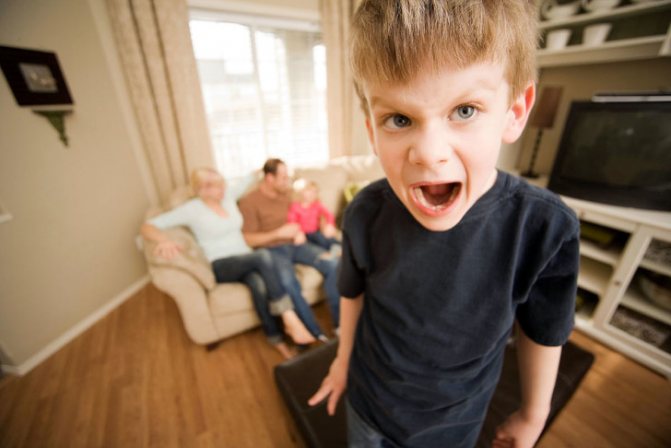
Moreover, such blows may not be weak. Older children may make verbal threats, scaring parents by banging their heads on the floor.
Solution. Don't let your child manipulate you, don't stop him. If necessary, offer your child a pillow or other soft object to vent their negative emotions on.
Cause. Often children hit their foreheads on the floor in order to achieve some selfish goal.
For example, a child asked to buy a toy or chocolate in a store, but the mother refused (this does not have to be in the store, the child may not get something at home). And here the boy will not miss the opportunity to test the parent’s patience with hysterics.
This scene always looks the same: a child, sprawled on the floor, screams, squeals and hits his head on the floor with tears in his eyes.
Let’s say your child wants to go for a walk, but you can’t go outside with him at the moment. Then the hysterics and beating on the floor begin again. This is also an attempt to express your grievance. Since he cannot throw out the entire stream of aggression on you, he takes it out on himself. Psychologists call this phenomenon auto-aggression.
Solution. If a child has committed such a prank in a public place, then it is recommended not to pay attention to others and their condemning glances. Your child is not the only one who does this.
How parents should behave
Firstly, you need to take a number of measures to generally prevent any manifestations of aggression and manipulation in your child in the future. More specifically, this requires:
- Do not sort out all your relationships with relatives in the presence of the child. For him, everyone must be good: father, mother, grandmothers, and grandfathers. No quarrels or stories about who is bad and who is good.
- You need to behave affectionately with your child, but not babysit. Tell him everything, show him, play, spend more time so that he does not feel that he is deprived of attention. Talk to your child regularly from early childhood.
- Don't yell at your child or lower his self-esteem. Don’t say that he is bad or good, doesn’t know how to do anything, etc. If a child does something wrong, then it needs to be explained calmly.
- Do not succumb to the child's manipulations from childhood. If the baby didn’t hit himself too hard, don’t rush to run to him shouting “ah-ah-ah”; if he doesn’t hurt anything, then he will calmly continue going about his business.
- If you see that a child is deliberately hitting himself, then you need to use two options: calmly say that you can’t do that and then simply try not to pay attention to him the next time.
- If your child is upset about something or something didn’t work out for him, then try to help him solve the problem, put the construction set together, or find another interesting activity.
Trying to get attention
In the hustle and bustle of everyday work, we do not notice how sometimes the child lacks attention. Therefore, the ritual of “banging” your head on hard objects can be a kind of attempt to attract attention. At such moments, the baby may not be upset, cry or try to throw a tantrum, but even vice versa – smile and look at the parent with interest. In this way, he again checks the reaction of his loved ones.
Sometimes a child may punish himself in this way for any offenses that he is aware of, trying to attract the attention of his parents, who may feel sorry for him. Your task in this case is again simple - do not pay attention
In such situations, the child does not knock very hard with the back of his head, which will not cause him any harm. But still, if you notice that the child is banging his head against the wall, distract him - play with toys, hug, kiss and stroke him. Children very acutely feel the lack of attention and this needs to be compensated
Your task in this case is again simple - not to pay attention. In such situations, the child does not knock very hard with the back of his head, which will not cause him any harm. But still, if you notice that the child is banging his head against the wall, distract him - play with toys, hug, kiss and stroke him. Children very acutely feel the lack of attention and this needs to be compensated.
In what cases should you consult a doctor?
If your child begins to regularly throw tantrums at you and beat himself, you tried to have explanatory conversations with him, but nothing helps, then in this case you need to contact a specialist in the child psyche.
In addition to the fact that the child hits himself on the head, he also:
- Begins to transfer his anger to others.
- Wakes up at night from nightmares.
- He begins to lose consciousness.
- Chokes during hysterics.
- He starts vomiting.
If you observe one or more of these symptoms, it is better to consult a specialist, and urgently.
Well, that’s all I have for today, take care of your children, do not create a tense situation in the family, so as not to traumatize the child’s psyche that has not yet formed.
Question from Gulnara, Krasnoufimsk:
My son is 8 years old. For disobedience I spanked my butt. I'm not touching it now. Now the child beats himself, punishes himself. It scares me.
Answered by Tatyana Sosnovskaya, teacher, psychologist:
Hello, Gulnara!
You are absolutely right to stop using physical punishment on your child. Modern children need to be raised using modern methods, taking into account their natural characteristics, desires and capabilities. , this has extremely negative consequences. But what to do when a child hits himself? Why is this happening? Let's try to understand this issue with the help of System-Vector Psychology by Yuri Burlan.
For every child, parental beating is stressful. But different children react to this stress differently. A child with a cutaneous vector feels pain most acutely from physical punishment; his thin, delicate skin cannot withstand such harsh influence. With systematic punishment, to adapt to stress and to extinguish pain, the flexible psyche of the skin child begins to produce natural opiates. A paradoxical reaction occurs: after pain it becomes pleasant! Gradually, a person begins to receive subconscious pleasure when he feels bad and in pain. This is the mechanism for the formation of the so-called masochistic scenario in the skin vector and lies the reason why the child beats himself.
Some parents and educators even note a trend: such children seem to deliberately provoke adults and “run into” punishment: they deliberately break the rules, disobey, and become hooligans. At first, such behavior can be confused with the independent behavior of a child with a urethral vector, but they are fundamentally different. The urethral person simply does not care about prohibitions; he is less likely than others by nature to need parental care.
When a child hits himself, he, as if punishing himself, receives his distorted little pleasure through the initiation of pain on the skin. Until the child grows up, his psyche is developing, so everything can still be corrected!
There are children who hit themselves on the head or bang their heads quite hard against the wall. These manifestations can be observed in children of a fairly early age, up to a year. The reason for this behavior is different - this is a serious symptom of the beginning of trouble in the development of the sound vector. This is the topic of our next article.
If such auto-aggression is auditory, then for boys with the cutaneous-visual ligament of vectors, sacrifice may be characteristic - I will hit myself. It is these children who become outcasts at school, whom everyone pecks and bullies. And here, in addition to the skin, it is very important to understand the state of the visual vector and its correct development. A child with an anal vector, very dependent on his mother, her opinion, obedient and driven, can beat himself, wanting to please his mother. “I will do everything as you want, even punish myself, just love me.”
That is, the same behavior of a child can be dictated by different internal states and their causes. You can understand them by well understanding the child’s psyche. You can learn this at the full training on system-vector psychology by Yuri Burlan. And in this article we will dwell in a little more detail on one of the possible aspects - the characteristics of the reactions of the skin vector.
Child hits his head
I also asked myself the same question.
And they sent me this article about this. I found this information:
The child hits his head. What to do?
Mary Poppins Tips
19.06.11, 23:24
Author yavsemogu
The problem is surprisingly common among children aged 2-3 years (up to 20 percent of children this age bang their heads on the floor or wall, with boys doing it three times more often than girls). This behavior usually begins around 7 months of age and reaches its peak at 18-24 months. The habit can persist in a child for several months, or less often years, and disappears when the child reaches 3 years of age.
Why does a child hit his head against the wall?
Reasons why a child hits his head on hard objects:
Self-control. It sounds a little unusual, but some children bang their heads, for example, on the floor to relax. A child may rhythmically bang his head against a wall or crib, for example, when falling asleep in the evening or waking up in the middle of the night.
Pain. A child is much more likely to hit his head when he has, for example, ear pain or is suffering from some other physical discomfort. In this case, the child uses strange behavior to try to distract himself from unpleasant sensations.
Frustration. Quite often, children begin to bang their heads against hard objects in a fit of anger, thereby demonstrating how angry he is. The baby does not yet know how to express emotions in words, so he uses this “body language”.
Thirst for attention
Everything is simple here (relatively speaking, of course): the child bangs his head against something, knowing that this will attract your attention
Developmental problems. This behavior, in addition to the reasons listed above, may be associated with autism and other developmental problems. In rare cases, the very fact that a child hits his head against walls, or the floor, or something else, signals serious developmental problems in the child. In such cases, parents need to urgently contact specialists.
How to deal with the fact that a child hits his head on hard objects?
Give your child attention, but not when he starts banging his head on hard surfaces. Firstly, do not bring the situation to the point where you pay attention to the child and spend time on him only if he attracts your attention to himself in such a non-standard way
Secondly, do not punish the child if he begins to “flagellate himself”, just pretend that nothing is happening.
Protect the child from bodily harm: as many rugs and rubber surfaces as possible in the child’s field of vision. Try to make sure that the child does not pull all kinds of bolts and other small parts into his mouth. The baby’s crib should also have as many soft parts as possible (the baby goods industry now offers a lot of all kinds of pads for cribs). If the child sleeps in a regular crib, you need to put a blanket bolster against the wall or hang a soft rug on the wall.
Try not to worry about this. Your baby may give himself a few bruises, but there is no need to worry too much about it. First of all, keep in mind that this behavior is self-regulating: that is, your baby has absolutely no intention of causing himself serious injury, since he knows perfectly well what pain is.
Help your child develop a sense of rhythm in other ways. Yes, yes, the child may simply like the rhythm of this action, in which case your task is to teach the child to dance, march or clap to the music, bang on the children's drum, etc.
Start getting ready for bed early. If your child has difficulty falling asleep due to overstimulation after a hard and noisy day, preparing your baby for sleep in advance will help you: a warm bath, soft music, back scratching or a calm story from your lips are a few possible options to help your child relax.
Contact a professional if your child's behavior begins to bother you. If your child hits his head against the wall very often, if he hurts himself and even this does not stop him, you should consult a pediatrician or other child development specialist.
Autistic children often have poor interactions with others. They are usually not interested in physical contact with their parents and look “through” people rather than at them. If you notice that your child is losing any behavioral or language skills, that your child is too withdrawn or has difficulty learning new behavior patterns, etc., you need to contact a doctor.
What to do if a child hits himself
Working with a child with a skin vector who hits himself should go in two directions.
First and most important:
restoring the child’s sense of safety and security.
Second:
fulfilling the desires of the skin vector.
The motto of raising a child with a skin vector:
- Weasel
- Logics
- Discipline
- Sport
A child with a skin vector needs affection, and he himself is very affectionate, like a kitten. From spanking and rough handling of his skin, he may begin to avoid physical contact. When a child hits himself, it is actually his cry for help. Hug, kiss, pat the back, give a massage at night - use these simple actions, and you can gradually return your child to his psychological comfort!
Just forbid something to a skin child “because I said so!” not worth it. It is better to logically explain to him the reason for the prohibition or rule, and he will comply with your restrictions. With the right approach, he will even learn. After all, self-restraint is what gives an adult skinman pleasure and allows him to limit others, that is, to lead. You can also develop logic with the help of interesting constructors, puzzles, math classes and other things.
When you hit a child, he experiences enormous stress, but this does not teach him anything. On the contrary, he loses the ability to develop. But discipline and reasonable restrictions have an encouraging effect on the skinner. For example, if a child with an anal vector is told that he has half an hour for lessons, he may simply become stupefied. But for the leather worker, this is an incentive to do everything quickly and efficiently. “And if you also manage to write a schedule in your diary, you’ll get candy!” Don't doubt it - he will make it.
Understanding the psyche of a child who beats himself will help you forget about this problem and raise a wonderful person. A daily routine, a schedule of tasks for the week, rewards for a job well done teach such a child to hard work, self-discipline, healthy competition, and satisfy his desire to be first. The ideal image of a developed skin vector is a military officer. But self-discipline is needed everywhere: in business, work, especially leadership.
And of course, sports. Skin babies are naturally very mobile. It is in physical activity, rhythm, competition (just don’t take children under adolescence to a modern or oriental dance studio, early sexualization in these areas harms the child’s psyche). With the right approach to a skin child, he will no longer have a reason to hit himself.


